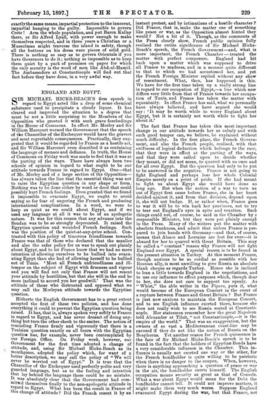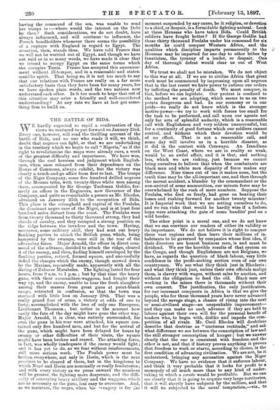ENGLAND AND EGYPT.
SIR MICHAEL HICKS-BEACH'S firm speech in regard to Egypt acted like a drop of some chemical substance used to precipitate a cloudy liquor. It has cleared and improved the situation to a degree that must be not a little surprising to the Members of the Opposition who greeted it with such grave forebodings in the House of Commons. In effect Mr. Morley and Sir William Harcourt warned the Government that the speech of the Chancellor of the Exchequer would have the gravest and most regrettable consequences. Practically, they sug- gested that it would be regarded by France as a hostile act, and Sir William Harcourt even described it as containing the language of menace and defiance. In truth, the House of Commons on Friday week was made to feel that it was at the parting of the ways. There have always been two schools of opinion in regard to what ought to be our attitude towards France in regard to Egypt. One—that of Mr. Morley and of a large section of the Opposition— has always taken the line that the essential thing was not to raise the Egyptian question in any shape or form. Nothing was to be done either by word or deed that could possibly hurt French feelings. Even granted that we found it impossible to evacuate Egypt, we ought to avoid saying so for fear of angering the French and producing international complications. In a word, we were to keep as quiet as we could about Egypt, and if we used any language at all it was to be of an apologetic nature. It was for this reason that any advance into the Soudan was to be so strongly deprecated. It raised the Egyptian question and wounded French feelings. Such was the position of the quiet-at-any-price school. Con- trasted with this policy of timorous friendliness towards France was that of those who declared that the manlier and also the safer policy for us was to speak out plainly about Egypt, and to let France know that we had no more intention of allowing ourselves to be bullied into evacu- ating Egypt than she had of allowing herself to be bullied out of Tunis. Meet all French unfriendliness and ill- temper on the subject of Egypt with firmness and vigour and you will find not only that France will not resent your attitude by hostilities, but that she will in the end be more inclined to accord you her goodwill' That was the attitude of those who distrusted and opposed what we may call the Morleyan attitude towards the Egyptian question.
Hitherto the English Government has to a great extent accepted the first of these two policies, and has done everything it could to prevent the Egyptian question being raised. It has, that is, always spoken very softly to France in regard to Egypt, and has never dreamt of doing any- thing but turn the other cheek to the smiter. The notion of reminding France firmly and vigorously that there is a Tunisian question exactly on all fours with the Egyptian question has, for example, never been contemplated by our Foreign Office. On Friday week, however, our Government for the first time adopted a change of attitude, and, using Sir Michael Hicks-Beach as its mouthpiece, adopted the policy which, for want of a better description, we may call the policy of "We will never be worried out of Egypt." It is true that the Chancellor of the Exchequer used perfectly polite and very guarded language, but as to the feeling and intention that lay behind the language there could be no mistake. It was absolutely clear that the Government had com- mitted themselves finally to the non-apologetic attitude in regard to Egypt. What has been the result in France of this change of attitude ? Did the French resent it by an instant protest, and by intimations of a hostile character ? Did France, that is, make the matter one of something like peace or war, as the Opposition almost hinted they would ? Not a bit of it. Though, as the comments of the Press clearly show, French public opinion fully realised the entire significance of Sir Michael Hicks- Beach's speech, the French Government—and, what is more important, the French Chamber — treated the matter with perfect composure. England had hit back upon a matter which was supposed to drive all France to madness, and in a manner quite different to that to which we had accustomed her, and yet the French Foreign Minister replied without any show of resentment. What, then, has happened is this. We have for the first time taken up a really strong line in regard to our occupation of Egypt,—a line which now differs very little from that of France towards her occupa- tion of Tunis, and France has taken the matter with. equanimity. In effect France has said, what we personally have always believed, and have argued she would say : It may be worth while to worry England about Egypt, but it is certainly not worth while to fight her about it.'
The fact that France has taken this most important change in our attitude towards her so calmly and with such good temper can, we believe, be explained without much difficulty. In the first place, the French Govern- ment, and also the French people, realised, with that swiftness of logical deduction which belongs to the race, that they were in effect at the parting of the ways, and that they were called upon to decide whether they meant, or did not mean, to quarrel with us once and for all over Egypt. But the question had only to be put to be answered in the negative. France is not going to fight England and perhaps lose her whole Colonial Empire merely on a point of pride. If she had meant to fight us about Egypt she would have done so long ago. But when the notion of a war to turn us out of Egypt first came before France, she in her heart decided against it, and from that decision, depend upon it, she will not budge. If, or rather when, France goes to war it will be to win back her provinces, not to try to tear out England's eyes in spite and vexation. Such things could not, of course, be said in the Chamber by a responsible Minister, but they were put plainly enough in the Press. Many of the writers put the matter with absolute frankness, and admit that unless France is pre- pared to join hands with Germany—and that, of course, means that Alsace and Lorraine are lost for ever—it is absurd for her to quarrel with Great Britain. This may be called a "constant" reason why France will not fight England over Egypt. A special reason is to be found in the present situation in Turkey. At this moment France, though anxious to be as cordial as possible with her Russian ally, is most unwilling to give Russia an absolute blank cheque as regards Turkey. Hence she is inclined to lean a little towards England in the negotiations, and to use our influence to effect purposes which, though dear to her, she does not care to support too openly. As "Whist," the able writer in the Figaro, puts it, what would become of the European Concert in the event of a rupture between France and Great Britain ? But France is just now anxious to maintain the European Concert, and to see English influence exerted there, because she does not really wish to see Russia seated at Constanti- nople. Her statesmen remember how the great Napoleon told Alexander at Tilsit, "not Constantinople,—it is the empire of the world." That was an exaggeration, but the owners of so vast a Mediterranean coast-line may be excused if they do not like the notion of Russia on the Bosphorus. Yet another reason for French quiescence in the face of Sir Michael Hicks-Beach's speech is to be found in the fact that the holders of Egyptian Bonds have a very considerable influence in the Chamber. This in- fluence is usually not exerted one way or the other, for the French bondholder is quite willing to be patriotic when there is no danger to the coupon: When, however, there is anything approaching a question of peace or war in the air, the bondholder exerts himself. The English occupation means security as great as that of Consols. What a war about Egypt would mean for the Debt the bondholder cannot tell. It could not improve matters, it might make them very much worse. Suppose England evacuated Egypt during the war, but that France, not having the command of the sea., was unable to send her troops in :—where would the interest on the Debt be then ? Such considerations, we do not doubt, have always influenced,, and will continue; to influence, the French bondholders whenever there seems the possibility Of a rupture with England in regard to Egypt. The situation, then, stands thus. We have told France that we will not be worried out of Egypt, and. though we have not said so in so many words, we have made it clear that ' we intend to occupy Egypt on the same terms which• she occupies Tunis. France has accepted this announce- ment without ill-temper, and in a reasonable and states- manlike spirit. That being so, it is not too much to say that our relations with France are really on a far more satisfactory basis than they have been for many years, for we have spoken plain words, and the two nations now understand each other. Is it too much to hope that out of this situation may arise a friendly and well-considered understanding ? At any rate we have at last got some- thing firm to build on.



































 Previous page
Previous page